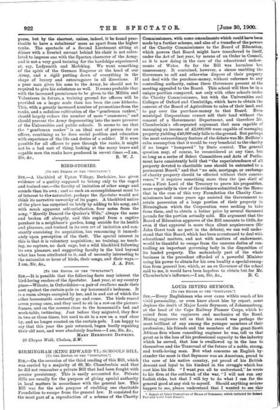BIRMINGHAM (KING EDWARD VI.) SCHOOLS BILL. [To TILE EDITOR OF
THE "SPECTATOR."] Sin,—On the occasion of the third reading of this Bill, which was carried by a majority of 68, Mr. Chamberlain said that he did not remember a private Bill that had been fought with greater persistency. This is easily accounted for. Private Bills are usually for the purpose of giving special authority in local matters in accordance with the general law. This Bill was for the sole pwpose of enabling one charitable Foundation to escape from the general law. It consisted for the most part of a reproduction of a scheme of the Charity Commissioners, with some amendments which could have been made by a further scheme, and also of a transfer of the powers of the Charity Commissioners to the Board of Education, which powers that Board might have transferred to itself, under the Act of last year, by means of an Order in Council, as it is now doing in the case of the educational endow- ments of Wales. So far the Bill was harmless but. unnecessary. It contained, however, a clause enabling the Governors to sell and otherwise dispose of their property and deal with the purchase-money, without reference to any controlling authority, unless three Governors present at the meeting appealed to the Board. This school will thus be in a unique position compared, not only with other schools under the Charity Commissioners, but with the Universities and Colleges of Oxford and Cambridge, which have to obtain the consent of the Board of Agriculture to sales of their land, and to pay over the purchase-money to that Board. Even municipal Corporations cannot sell their land without the consent of a Government Department, and therefore Mr. Chamberlain's oft-repeated argument that men capable of managing an income of £2,000,000 were capable of managing property yielding 240,000 only falls to the ground. But perhaps the most extraordinary feature of the debate was Mr. Balfour's calm assumption that it would be very beneficial to the charity if no longer " hampered " by State control. The general question may, of course, be reconsidered at any time, but so long as a series of Select Committees and Acts of Parlia- ment have consistently held that "the superintendence of all property devoted to charitable uses should be entrusted to a permanent Board," and that "no sale, mortgage, or exchange of charity property should be effected without their concur- rence,"* it requires something more than the ipse clizit of even a First Lord of the Treasury to prove his proposition, more especially in view of the evidence submitted to the House that in the ease of this very Foundation the Charity Com- missioners had some years ago assisted the Government to retain possession of a large portion of their property in Birmingham which the Corporation were seeking to take from them, and to obtain a better price by several thousand pounds for the portion actually sold. His argument that the Board of Education approves of the Bill amounts to little, for even if that approval is more than silent acquiescence (Sir John Gorat took no part in the debate), we can well under- stand that this Board, which has been accustomed to deal with educational matters, and not with matters of endowment, would be thankful to escape from the onerous duties of con- trolling an important governing body in the disposition of its landed property. The melancholy part of the whole business is the precedent afforded of a powerful Minister using his power to obtain for his own locality a special exemp- tion from general law, which, as an ex Governor of the school said to me, it would have been hopeless to obtain but for Mr.
Chamberlain's influence.—I am, Sir, &c., D. C.


















































 Previous page
Previous page